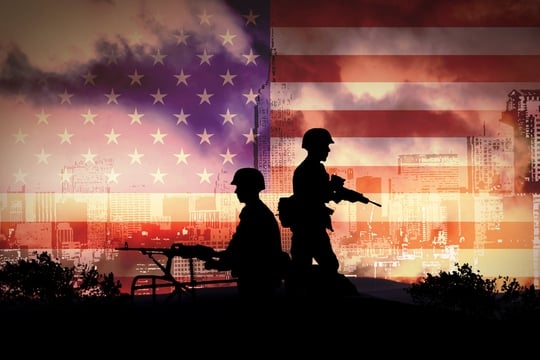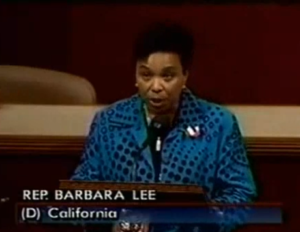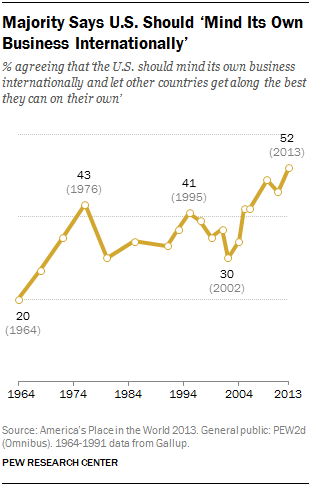Let’s be honest, foreign policy making has never been democratic. The label of national security has offered governments around the world the power to hide information from their citizens. Aside from this statement, the making of American foreign policy has completely shifted since 9/11. Not only this shift was abrupt and made under intense emotional stress, but it has also created a precedent in the way the U.S. engages in the world. Additionally, American foreign policy has become much more militarized than in the past. A series of recent articles (here and here), documentaries (here and here), and radio show (here) have been produced looking back at the way the U.S. has conducted itself these last 13 years on the international stage.
Since 9/11, the U.S. has been fighting “evil” – to adopt a very Bushian expression – with evil. The U.S. has used a wide array of instruments considered by international law as illegal such as: rendition, torture — known as an “enhanced interrogation technique” — use of force against countries without legal jurisdiction, drone strikes in countries wherein the U.S. is not at war, mass snooping on American and world citizens, cover-up operations, and so forth. The “Global War on Terror” has been the longest war in American history. Since 2001, the U.S. has invaded two countries – Iraq and Afghanistan – launched an undisclosed numbers of drone strikes in countries with which the U.S. is not at war – Yemen, Pakistan, and Somalia (here are the numbers of drones strikes as of April 2014) – and all this in complete impunity.
The real question is: Has it made America safer? It is a very difficult subject to answer in all impartiality. Members of American intelligence community and other departments of the U.S. government would most likely say yes. Not only, I would tend to answer, not really, but I would also argue that American democracy has progressively been the main collateral damage of this endless war.
The starting point in the shifting in decision-making in American foreign policy was the approval of the Authorization for Use of Military Force, of what is known as the AUMF. The famous sentence, as reported by Gregory E. Johnsen and which inspired the Radiolab podcast posted below, that changed it all were these 60 words from the AUMF drafted on Sept. 12, 2001:
That the President is authorized to use all necessary and appropriate force against those nations, organization, or persons he determines planned, authorized, committed, or aided the terrorist attacks that occurred on September 11, 2011, or harbored such organizations or persons in order to prevent any future acts of international terrorism against the United States by such nations, organizations or person.
In French, we would say that the president has now carte blanche, meaning unlimited power. This sentence taken from AUMF pretty much gives unlimited power to the executive branch without any supervision by the Congress, as it gave it up soon after 9/11. Such legal piece was approved by Congress on Sept. 13, 2001 at the exception of only one elected official, the California Representative Barbara Lee, opposing it. In the excellent podcast of Radiolad, Barbara Lee takes us throughout her reflection process about taking
such decision. At the time she was under intense pressure, and was even called unpatriotic, a terrorist, and so forth. Today, she seems like a visionary as she not only understood the consequences of taking swift decisions under stress and emotions, but also foresaw the legal implications embedded in these words.
For instance, during a 2013 Senate Armed Service committee hearing chaired by Carl Levin – as reported in the Radiolab podcast – about the use of military force, DOD officials argued in favor of the continued use of the AUMF. Throughout the hearing the officials never named one enemy, but only referred to “associated forces.” Senator Angus King responded to these statements by DOD officials, saying: “you guys have essentially rewritten the Constitution here today.” King’s argument is that the DOD is using the concept of associated forces, not present in the AUMF, in order to justify the use of force against pretty much anyone. The AUMF has in fact changed the entire institutional design of use of force. “The Declaration of War is kind of a dead instrument of national law,” argued Ben Wittes, a senior fellow at the Brookings Institution in the Radiolab podcast. “But the modern incarnation of the Declaration of War is the Authorization for Use of Military Force (AUMF).”
Such comments fall under the fact that the list of American enemies and the people that the U.S. is in war against is secret. American citizens do not have and cannot have the information about the enemies. The absolute lack of supervision by one branch of the government over the other will undeniably lead to extreme decisions and situations. The Gulf of Tonkin Resolution is the perfect example, as it led the U.S. to a lengthy and costly war in Vietnam. Additionally, without a clear enemy, it implies that the U.S. could be at war indefinitely. At the distinction with Vietnam, Iraq and Afghanistan, this war seems foreign, remote, distant, and impersonal, making it even more dangerous to American democracy and political system.
Two core problems are at the heart of this nonexistent debate in America. One of the most worrisome dimensions is not the degree of secrecy, but rather that American public opinion simply does not care about the way the two most recent presidents have used forces and extended the power of the executive branch. The lack of interest by American public opinion is worrisome as they do not ask for accountability. In the case of the U.S., the latest numbers illustrates the progressive desire by American citizens for a more isolationist foreign policy. After the 2007 financial crisis, Western public opinion, and principally American public opinion, has started to believe in the “end of foreign policy,” a concept utilized by Richard Youngs in his 2014 book The Uncertain Legacy of Crisis. European Foreign Policy faces the Future, considering the lack of discussions and reflections on foreign policy. Such statement materialized public opinion feelings towards foreign policy making.
Second, with the polarization of American democracy and political system, the making of foreign policy is now more about avoiding a political crisis triggered by a failure to stop an attack than actually making the homeland safer. How can foreign policy be made given that, in the case that an attack occurs after restricting the power of the intelligence community and cutting the defense and intelligence budgets, there could be serious consequences for the political legitimacy and the future of a party and/or individual politicians. When politicians base their foreign policy and national security choices on the fear of losing an election, the overall democratic machine and political system are seriously broken. For instance, the politicization of the Benghazi bombing by the Republican party in order to attack Hillary Clinton and other high level Democrats is quite shameful. Unlimited power and budget without democratic supervision do not translate into greater security.
How can such a problem be solved? First, American foreign policy shall be understood as what it is, a policy. Emotions must be removed from decision-making. The decisions made right after 9/11 were irrational, considering the trauma caused by such a horrific event. Americans must reflect on the policies and rules implemented soon after 9/11 and decide on their future and their application and implementation.
Second, American citizens ought to start understanding that foreign policy matters more than before. In a globalized environment, a policy decision undertaken by a group of experts ought to be discussed. When the U.S. deploys drones against countries to kill alleged terrorist, the image of the U.S. is tarnished. How would American citizens react if China were to use drone strikes over the Silicon Valley in order to limit the power and influence of corporations advancing the freedom of social media? In the last political debates – both for presidential and legislative elections – foreign policy suffered from a lack of interest by voters. Furthermore, most American politicians have a weak understanding international relations.
Third, 13 years later, it is time to de-securitized the global war on terrorism. The U.S. cannot perpetually wage war. Neither the “Global War on Terror” or the drug war have solved their respective problems. Terrorism and drugs still exist and will continue to exist. Believing that both can be eliminated is quite foolish.
Last but not least, the AUMF is one among many current shifts in American democracy caused by a progressive implementation of laws removing transparency and accountability. National security, campaign financing, and other important segment of American politics are being striped away of transparency. This is a slippery slope for American democracy.
Source: foreignpolicyblogs.com



No comments:
Post a Comment